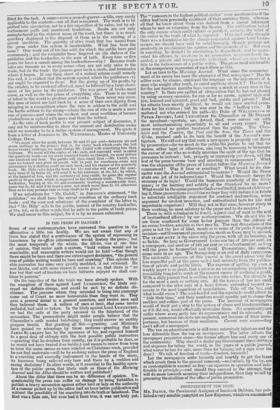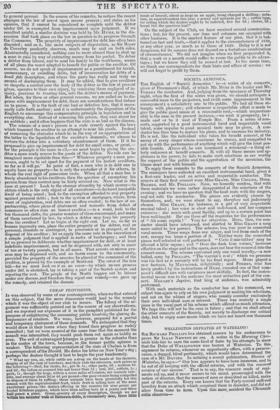IMPRISONMENVFOR DEBT.
Mn. DANCE, the Provisional Assignee of Insolvent Debtors, has published a very sensible pamphlet on Law Expenses, whiehwe recommend to general. perusal. In the course of his remarks, he notices the recent changes in the law of arrest upon mesne process ; and states as his i opinion, that t cannot be considered as complete until the debtor *under 20/. is exempted from imprisonment upon judgment. If we recollect aright, a similar doctrine was held by Mr. HUME, in the discussion that took place on the law in question in its progress through The Commons. The propriety of imprisonment for debt has often been disputed ; and on it, like most subjects of disputation, as Sir Roger de Coverley prudently observes, much may be said on both sides. Abstractedly considered, nothing can be more absurd than to shut up a man in gaol by way of extracting money from his pocket. To debar a debtor from labour, and to send his family to the workhouse, seems of all plans the worst adapted to benefit the public or the creditor. Of course, we do not speak of imprisonment as a punishment for lavish, unnecessary, or swindling debts, but of incarceration for debts of a bona fide description, and where the party has really and truly no means of discharging them. It may be added, that to give creditors so despotic a control over the body of the debtor as the law at present gives, operates to their own injury, by rendering them negligent of inquiry, previous to trusting him, into the debtor's means of payment. , But when, for these or other general reasons, we are called on to dispense with imprisonment for debt, there are considerations that induce us to pause. It is the fault of one bad or defective law, that it neces sarily calls forth another; and it is unfortunately the disposition of the ; English to encourage this compensatory principle in legislation and in everything else. Instead of removing the poison, they cast about for an antidote ; and it often happens that the cure is as bad as the disease. I The seizure of a man's person is a rude remedy against the laws ; which trammel the creditor in an attempt to seize his goods. Instead of removing the obstacles which lie in the way of an appropriation of ; the latter to the liquidation of the creditor's demands, we choose to ' torture the debtor into a voluntary abandonment of them. If it be proposed to give up imprisonment for debt for small sums, or great,— for the principle is the same in all,—we must begin by giving the cre ditor a more ready access to the goods of the debtor. No rule can be imagined more equitable than this—" Whatever property a man possesses, ought to be set apart for the payment of his honest creditors, so far as it will go." In point of fact, a man who is in debt can in equity have no property—he is only the custodier of it for others, in ' whom the real right of' possession vests. When all that a man has is freely abandoned to his creditors, then the question of exempting his person from their control may be fairly entered on. Now what is the case at present? Look to the strange absurdity by which money—to obtain which is the only object of all executions—is declared incapable itself of being seized ; look to the exemption afforded to real property against personal debts ; look to the system of mortgages, where, from want of registration, real debts are so often evaded ; to the law of co partnership, where pleas of abatement and nonsuits from defect of summons so often ruin an honest creditor ;—in a word, look to the ten thousand shifts, the greater number of them encouraged, and many of them sanctioned by law, by which a debtor may keep his property from his creditor! Let us begin at the right end. Let us, so far as human ingenuity can, place the entire property of the debtor, real or " personal, absolute or contingent, in possession or in prospect, at the disposal of his creditor ; let us apply the same rule in the execution of a simple judgment that is applied in castes of bankruptcy ; and then let us proceed to deliberate whether imprisonment for debt, or at least indefinite imprisonment, may not be dispensed with, not only in cases of ten or twenty pounds, but in all cases. That arrests on mesne process may be dispensed with, and no harm ensue to the community?, provided the property of the an-estee be placed at the command of the creditor, is proved by the example of Scotland. The error of the late bill—for we must look on it as an error—by which mesne process under 20/. is abolished, lay in taking a part of theBcotch system and rejecting the rest. The people of the North happen not to labour under our disease, and therefore they reject our remedy—we gave up the remedy, and retained the disease.



















 Previous page
Previous page